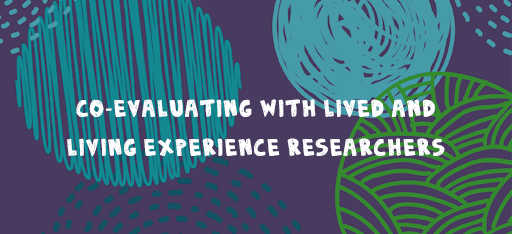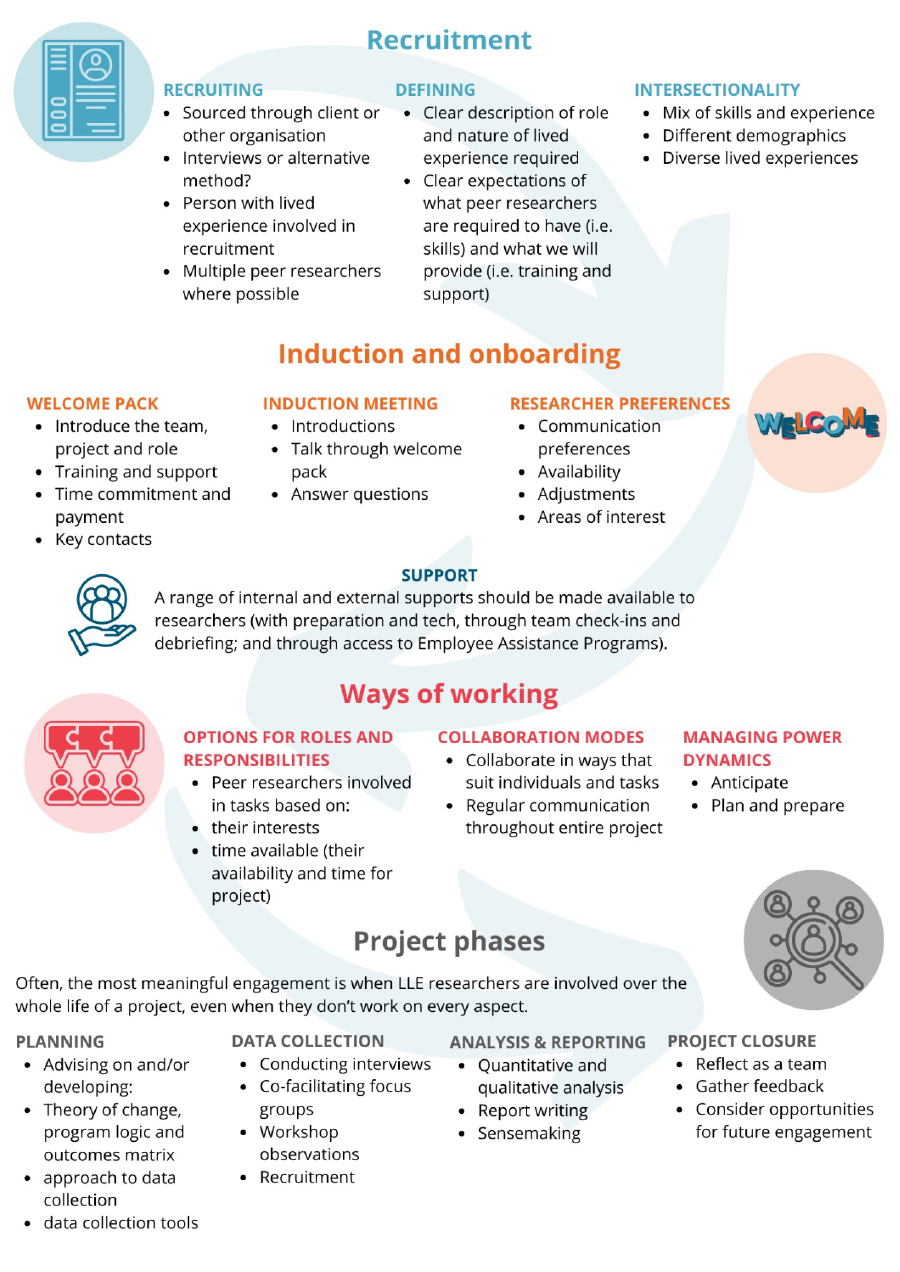Welcome to the AES Blog
Working with lived experience researchers: a practical framework
by Jade Maloney, Sharon-Marra Brown, Alexandra Lorigan and Rosie Dale
At AES22, ARTD Consultants' Jade Maloney, Sharon Marra-Brown, Alexandra Lorigan and Holly Kovak presented on a panel with peer researchers, Kirsty Rosie and Rosie Dale, on the practicalities of co-evaluating with lived and living experience (LLE) researchers.
Co-evaluation like co-design is informed by the principle of 'nothing about us, without us.' While co-design recognises the rights of people with lived experience to shape the policies and programs that affect their lives and the way this strengthens policy, co-evaluation recognises the expertise that people with lived experience bring to designing measures of success, collecting data and making sense of findings and the way this can strengthen evaluation.
- the evaluation commissioner and evaluation team having a shared commitment to genuine engagement that ensures LLE researchers have the ability to shape the work
- the need for the evaluation team and evaluation commissioner to be flexible and open to things changing as the evaluation progresses.
The ARTD team provided a framework that sets out an approach to engaging with lived and living experience team members in a concrete way (covered in brief below) and discussed with the panel of LLE researchers what makes this kind of collaboration work.
-
-
From the LLE researchers' perspective, the things that make this kind of collaboration work are deep listening, being able to function in a state of uncertainty and not knowing, transparent communication and checking in on assumptions and shared vision. Rosie Dale worked with ARTD on co-producing and evaluating an aftercare support service for children and young people following significant suicidal ideation, self-harm or a suicide attempt. She has summarised her experience of what makes co-evaluating with lived experience researchers work, below.
| What's the reality of being a peer researcher? |
| Rosie Dale, Peer Researcher |
| Where do you feel you've been able to make the most difference? It is very fulfilling and rewarding to represent someone with lived experience. I also enjoy having opportunities to give input into lots of little things (e.g., referral forms, experience measures, survey questions, co-production workshop, program logic, outcomes matrix, evaluation methods) which all add up to something big! Participating in both the evaluation with ARTD and the co-production workshop held by the aftercare service gave me unique insights. It felt empowering to see my name and quotes appearing in the co-production report. What helps you do this? What helped you to feel a part of the team?
What is challenging about co-evaluating?I believe that we all have the same goal, but due to different ways of thinking and values, we end up wanting to achieve it in so many different ways! There can be so many different questions, different ways of asking these questions, and different ideas on the best way to ask these questions. Everything from life experience to tertiary studies can inform how we go about asking things and what we think should be prioritised.
What do organisations (evaluators and evaluation commissioners) that want to work with peer researchers need to consider?
|
The ARTD team looks forward to continuing to develop our framework, and insights around working with LLE researchers. Read a more in-depth overview of our insights and panel discussions here.
------------------------------------------------
Jade Maloney
Jade is the Managing Director and a Partner at ARTD. She works with government agencies, not-for-profits and citizens to co-design, refine, communicate and evaluate social policies, regulatory systems and programs. She is passionate about ensuring citizens have a voice in shaping the policies that affect their lives, translating research into real world contexts, and ensuring evaluations are useful and used.
Sharon-Marra Brown
Sharon is a Senior Manager at ARTD. She describes her work as being curious for a living, and is an evaluation and organisational performance specialist, combining technical excellence with emotional intelligence. Sharon has a wealth of experience of work in the public service and consulting in health, mental health and suicide prevention.
Alexandra Lorigan
Alexandra is a Senior Consultant at ARTD, where she supports evaluations and reviews in areas of complex social policy, most commonly in the mental health and disability sectors. She is passionate about building social inclusion through initiatives that support or build the capacity of people with lived experience, their families and carers, and the organisations supporting them.
We acknowledge the Australian Aboriginal and Torres Strait Islander peoples of this nation. We acknowledge the Traditional Custodians of the lands in which we conduct our business. We pay our respects to ancestors and Elders, past and present. We are committed to honouring Australian Aboriginal and Torres Strait Islander peoples’ unique cultural and spiritual relationships to the land, waters and seas and their rich contribution to society.






